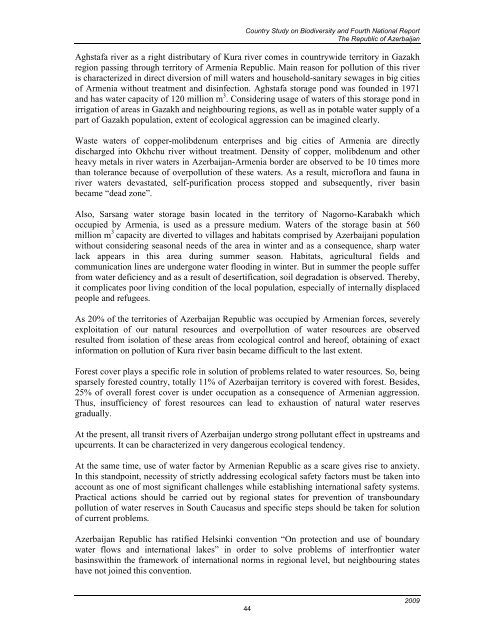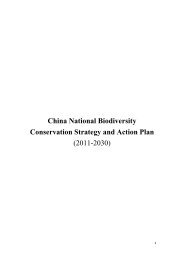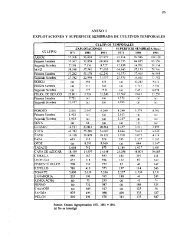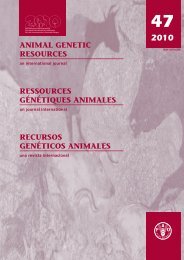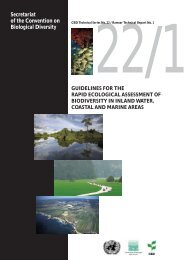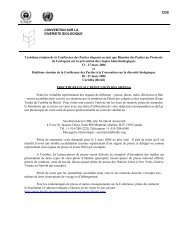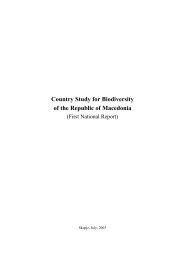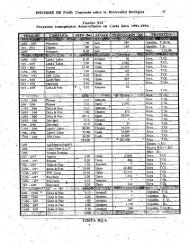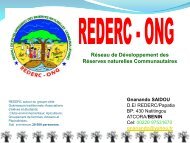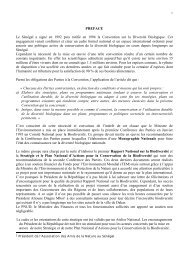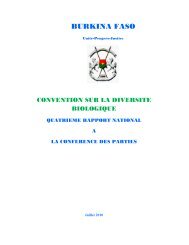CBD Fourth National Report - Azerbaijan (English version)
CBD Fourth National Report - Azerbaijan (English version)
CBD Fourth National Report - Azerbaijan (English version)
Create successful ePaper yourself
Turn your PDF publications into a flip-book with our unique Google optimized e-Paper software.
Country Study on Biodiversity and <strong>Fourth</strong> <strong>National</strong> <strong>Report</strong><br />
The Republic of <strong>Azerbaijan</strong><br />
Aghstafa river as a right distributary of Kura river comes in countrywide territory in Gazakh<br />
region passing through territory of Armenia Republic. Main reason for pollution of this river<br />
is characterized in direct di<strong>version</strong> of mill waters and household-sanitary sewages in big cities<br />
of Armenia without treatment and disinfection. Aghstafa storage pond was founded in 1971<br />
and has water capacity of 120 million m 3 . Considering usage of waters of this storage pond in<br />
irrigation of areas in Gazakh and neighbouring regions, as well as in potable water supply of a<br />
part of Gazakh population, extent of ecological aggression can be imagined clearly.<br />
Waste waters of copper-molibdenum enterprises and big cities of Armenia are directly<br />
discharged into Okhchu river without treatment. Density of copper, molibdenum and other<br />
heavy metals in river waters in <strong>Azerbaijan</strong>-Armenia border are observed to be 10 times more<br />
than tolerance because of overpollution of these waters. As a result, microflora and fauna in<br />
river waters devastated, self-purification process stopped and subsequently, river basin<br />
became “dead zone”.<br />
Also, Sarsang water storage basin located in the territory of Nagorno-Karabakh which<br />
occupied by Armenia, is used as a pressure medium. Waters of the storage basin at 560<br />
million m 3 capacity are diverted to villages and habitats comprised by <strong>Azerbaijan</strong>i population<br />
without considering seasonal needs of the area in winter and as a consequence, sharp water<br />
lack appears in this area during summer season. Habitats, agricultural fields and<br />
communication lines are undergone water flooding in winter. But in summer the people suffer<br />
from water deficiency and as a result of desertification, soil degradation is observed. Thereby,<br />
it complicates poor living condition of the local population, especially of internally displaced<br />
people and refugees.<br />
As 20% of the territories of <strong>Azerbaijan</strong> Republic was occupied by Armenian forces, severely<br />
exploitation of our natural resources and overpollution of water resources are observed<br />
resulted from isolation of these areas from ecological control and hereof, obtaining of exact<br />
information on pollution of Kura river basin became difficult to the last extent.<br />
Forest cover plays a specific role in solution of problems related to water resources. So, being<br />
sparsely forested country, totally 11% of <strong>Azerbaijan</strong> territory is covered with forest. Besides,<br />
25% of overall forest cover is under occupation as a consequence of Armenian aggression.<br />
Thus, insufficiency of forest resources can lead to exhaustion of natural water reserves<br />
gradually.<br />
At the present, all transit rivers of <strong>Azerbaijan</strong> undergo strong pollutant effect in upstreams and<br />
upcurrents. It can be characterized in very dangerous ecological tendency.<br />
At the same time, use of water factor by Armenian Republic as a scare gives rise to anxiety.<br />
In this standpoint, necessity of strictly addressing ecological safety factors must be taken into<br />
account as one of most significant challenges while establishing international safety systems.<br />
Practical actions should be carried out by regional states for prevention of transboundary<br />
pollution of water reserves in South Caucasus and specific steps should be taken for solution<br />
of current problems.<br />
<strong>Azerbaijan</strong> Republic has ratified Helsinki convention “On protection and use of boundary<br />
water flows and international lakes” in order to solve problems of interfrontier water<br />
basinswithin the framework of international norms in regional level, but neighbouring states<br />
have not joined this convention.<br />
44<br />
2009


